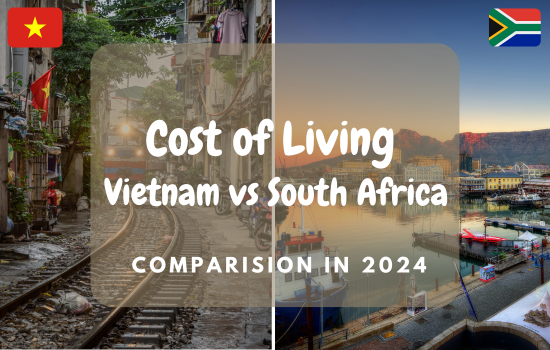Cost of living in Vietnam vs South Africa 2024
Vietnam is attracting a growing number of South African English teachers. When it comes to a new life in a new country, navigating the cost of living plays an important role. This article compares the 2024 cost of living in Vietnam and South Africa, focusing on essential categories like accommodation, utilities, transportation, food, and leisure activities.
1. Accommodation
Finding a comfortable and affordable place to live is crucial. Here's a cost comparison:
- Vietnam:
- Studio Apartment (City Center): $300-$500/month
- One-Bedroom Apartment (City Center): $400-$700/month
- House (Suburbs): $600-$1000/month
- South Africa:
- Studio Apartment (City Center): $500-$800/month
- One-Bedroom Apartment (City Center): $700-$1200/month
- House (Suburbs): $1000-$1500/month
Vietnam offers significantly cheaper housing options, particularly in major cities like Hanoi and Ho Chi Minh City. South African cities like Johannesburg and Cape Town have a higher cost of living, reflected in pricier rentals.
2. Monthly Utilities
Here's a breakdown of utilities you'll likely encounter:
- Electricity:
- Vietnam: $30-$50/month (average)
- South Africa: $50-$80/month (average)
- Water:
- Vietnam: $10-$20/month (average)
- South Africa: $20-$30/month (average)
- Household Furniture:
- Vietnam: Relatively inexpensive. You can find used furniture or rent furnished apartments.
- South Africa: Can be more expensive, especially for quality furniture.
- Wifi:
- Vietnam: $20-$30/month (average)
- South Africa: $30-$50/month (average)
- SIM Card:
- Both countries offer affordable pre-paid SIM cards with data packages starting around $10/month.
Overall, Vietnam has slightly cheaper utilities due to lower electricity costs. However, furniture might require a larger initial investment in South Africa.
3. Transportation
Getting around is an essential part of daily life. Here's a cost comparison:
- Public Transportation:
- Vietnam: Buses and taxis are very affordable, with bus tickets starting at $0.50 and taxi fares around $1 for short distances.
- South Africa: Public transport can be less developed in some areas. Bus fares are comparable to Vietnam, but taxis are slightly pricier.
- Fuel Costs:
- Vietnam: Gas prices are lower than in South Africa, averaging around $4/gallon.
- South Africa: Gas prices are higher, averaging around $5.50/gallon.
- Ridesharing:
- Both countries have ridesharing services like Be(Vietnam) and Uber (South Africa) offering competitive rates.
Vietnam generally offers cheaper public transportation and fuel costs. However, depending on your location in South Africa, ridesharing services might be a more convenient option.
4. Eating
Food is a significant expense. Here's a look at dining options:
- Groceries:
- Vietnam: Fresh produce, meat, and staples are very affordable. Expect to spend $50-$100/week on groceries.
- South Africa: Grocery prices can be higher, with a similar weekly budget potentially covering less.
- Eating Out:
- Vietnam: Street food is incredibly cheap and delicious, with meals costing around $2-$5. Restaurants offer a range of prices, with budget-friendly options readily available.
- South Africa: Eating out can be more expensive, with street food options less prevalent. Casual restaurants might cost around $10-$15 per meal.
Vietnam boasts a clear advantage for food costs. Street food offers a delicious and budget-friendly way to experience Vietnamese cuisine, while groceries are generally cheaper.
5. Sports & Leisure
Keeping active and entertained is important. Here's a cost comparison:
- Gym Membership:
- Vietnam: $20-$40/month (average)
- South Africa: $30-$50/month (average)
- Movie Tickets:
- Vietnam: $5-$8 per ticket
- South Africa: $8-$12 per ticket
- Outdoor Activities:
- Vietnam: Offers a variety of free or low-cost outdoor activities like hiking, exploring local markets, and visiting temples.
- South Africa: National Parks and other outdoor attractions often have entrance fees, but costs can be comparable to Vietnam depending on the activity.
Vietnam offers a slight edge in terms of leisure costs. Gym memberships and movie tickets are cheaper, and the abundance of free outdoor activities adds to its affordability.
6. Is it Cheaper to Live in Vietnam or South Africa?
Based on our comparison, Vietnam emerges as the more budget-friendly option. Here's a quick recap:
- Accommodation: Significantly cheaper in Vietnam.
- Utilities: Slightly cheaper in Vietnam, with furniture potentially more expensive in South Africa.
- Transportation: Public transport and fuel costs are lower in Vietnam.
- Eating: Street food culture and cheaper groceries make Vietnam a clear winner.
- Sports & Leisure: Costs are comparable, with Vietnam offering more free outdoor options.
However, the cost of living can vary depending on your lifestyle:
- Western vs. Local Lifestyle: Embracing the local way of life in both countries can significantly reduce your expenses. Cooking at home, using public transport, and exploring free activities will save you money.
- City vs. Rural Areas: The cost of living generally increases in major cities compared to rural areas. This applies to both Vietnam and South Africa.
Conclusion
Choosing between Vietnam and South Africa depends on your priorities and budget. Vietnam offers a lower cost of living across most categories, making it ideal for budget-conscious travelers or long-term residents. However, South Africa boasts a more developed infrastructure and a wider variety of international products and services.
Ultimately, the best choice depends on what you value most in a place to live. Consider your lifestyle preferences, career opportunities, and desired level of comfort when making your decision.
Additional Considerations:
- Cost of Visas and Permits: Research visa and work permit costs for each country before making a decision.
- Healthcare: Both countries have public healthcare systems, but private healthcare options might differ in cost and quality.
- Language: Vietnamese can be challenging for Westerners to learn, while South Africa has English as one of its official languages.
This article provides a starting point for your research. Be sure to factor in your specific needs and preferences to determine which country best suits your budget and lifestyle.


